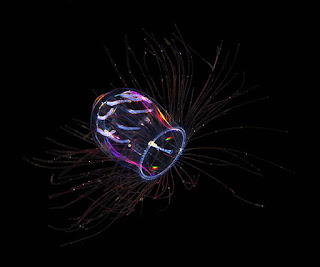 |
Jellyfish are in the animal group
of Cnidaria and among the most beautiful and unusual creatures of water life.
The name is especially given to the class Scyphozoa, but also to the classes
Hydrozoa and Cubozoa. Listed below are the few most beautiful jellyfish that, you
can find in the worlds oceans.
 |
| Big Red Jellyfish |
Big Red Jellyfish: Tiburonia granrojo or
Big Red Jellyfish is one of the largest sea jellies and unusual in a number of
ways. They live at ocean depths of 600 to 1,500 meters (2,000 to 4,900 ft) and
have been found across the Pacific Ocean in the Sea
of Cortez , Monterey
Bay , Hawaii and Japan
 |
| Transparent sea jelly |
Transparent
sea jelly (Aglantha digitale): Transparent sea jelly or Aglantha
digitale is the most common surface-dwelling jellyfish in Arctic
and sub-arctic waters. It is clear translucent, bell taller than breath, with a
small conical apical projection; 80 marginal tentacles generally destroyed
during capture; 8 radial canals, 8 statocysts; long gastric peduncle with 4
small simple lips; 8 white, sausage shaped gonads often obvious in larger
individuals. You can see it in Arctic Ocean, Barents Sea ,
Canada Basin, Canadian part
of the Arctic Ocean, European waters (ERMS scope), Gulf
of Maine , Gulf of St. Lawrence, Irish
Exclusive economic Zone, Mediterranean Sea ,
North East Atlantic, North Pacific, St. Lawrence Estuary, Storfjordrenna,
Storfjords and United Kingdom Exclusive Economic Zone
 |
| Flower Hat Jelly |
Flower
Hat Jelly: This jellyfish is a
rare species and is generally small in size with a width of just about six
inches. It is also known as Olindias Formosa Brazil ,
Argentina
 |
| Deep Red Jellyfish |
Deep-Red Jellyfish (Crossota norvegica): Deep-Red Jellyfish or Crossota
norvegica is deepwater polar hydromedusae. All about it: deep-red color, 10-14
radial canals, as opposed to eight radial canals common to other species of
Crossota, About 275 tenacles, Stomach bottle shaped, with irregular
longitudinal ridges and invaginations, 5-7 upturned lips, without gastric
preducles, Gonads on radial canals near base of stomach
 |
| Red Jellyfish |
Red
Jellyfish: Sea jellies such as Red
Jellyfish in the genus Benthocodon are commonly seen on or near the seafloor in
the Monterey Canyon
off central California , USA
No comments:
Post a Comment